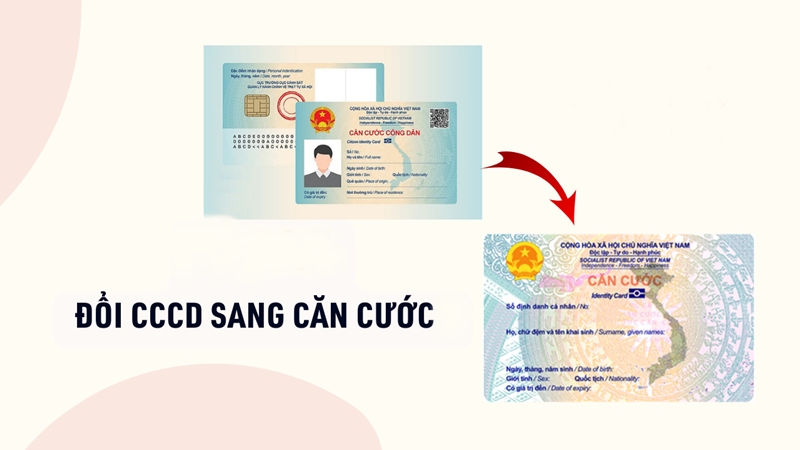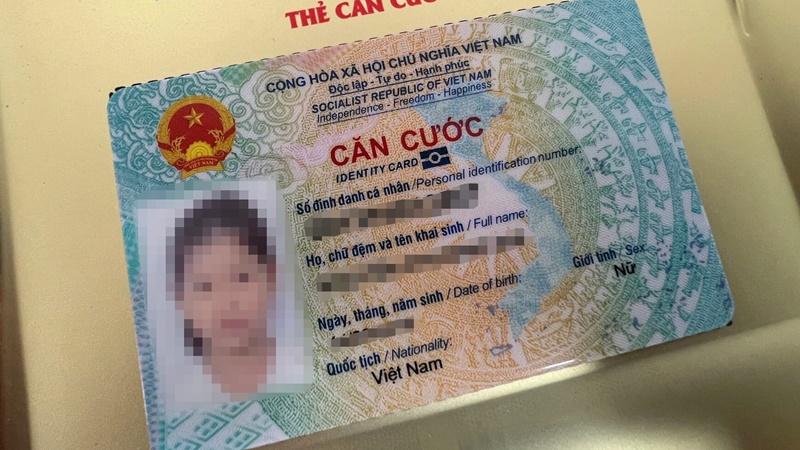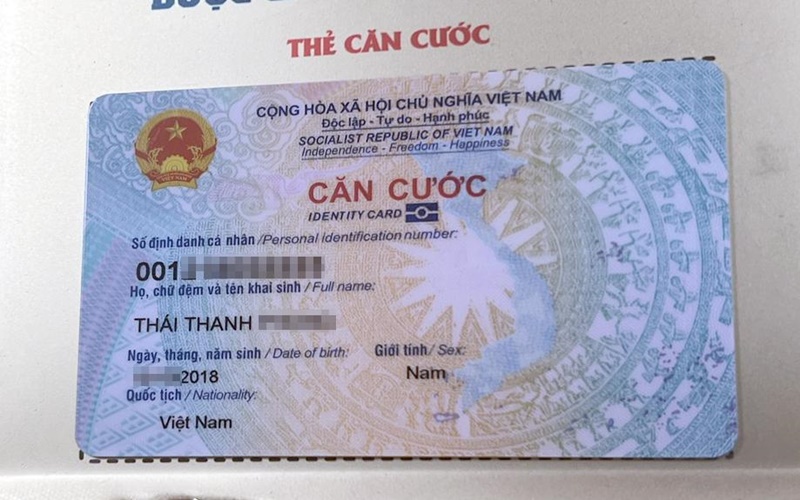From July 1st, 2024, the following cases will require a new ID card as per state regulations. Let’s find out what these cases are in today’s article!
1. Cases Requiring an ID Card Replacement from July 1st, 2024
 Cases Requiring an ID Card Replacement from July 1st, 2024
Cases Requiring an ID Card Replacement from July 1st, 2024
Starting July 1st, 2024, as per the Law on ID Cards, the following cases will require a mandatory ID card replacement:
- Vietnamese citizens aged 14 and above must undergo the ID card issuance procedure.
- ID cards with chips that expire after July 1st (expiration date printed on the front, bottom left corner of the card) must be replaced with new ID cards.
- The Law on ID Cards stipulates that all types of ID cards will be valid until December 31st, 2024. After this date, citizens must replace them with new ID cards.
- Additionally, citizens can apply for an ID card (upon request) in certain cases, including:
- Vietnamese citizens under 14 years old can apply for an ID card for the first time through a representative. This is a new regulation in the Law on ID Cards compared to the Law on CCCD, expanding the scope of ID card issuance.
- Citizens who already have a chip-based ID card but wish to replace it with a new ID card.
- Citizens with changes in personal information or ID card information due to administrative unit rearrangements or when the individual identification number is re-established.
2. Changes to the ID Card System from July 1st, 2024
 Changes to the ID Card System from July 1st, 2024
Changes to the ID Card System from July 1st, 2024
Officially Renaming the ID Card to the New ID Card
Along with changing the name of the law from the Law on ID Cards to the Law on ID Cards, the National Assembly also agreed to rename the ID card to the New ID Card.
Accordingly, Article 3, Clause 1 and Clause 11 of the Law on ID Cards define the following:
1. ID information includes basic information about an individual’s personal background, origin, distinctive features, and biometrics.
11. The ID card is a personal ID document containing ID information of Vietnamese citizens, issued by the ID management agency as stipulated in this Law.
Thus, this is the most important new feature of the Law on ID Cards from July 1st, 2024, compared to the previous regulations. Accordingly, the ID card contains basic information about an individual’s personal background, origin, distinctive features, and biometrics, including:
- Face image
- Individual identification number
- Given name, middle name, and surname at birth
- Date of birth
- Gender
- Place of birth registration
- Nationality
- Place of residence
Do Citizens Need to Replace Their Old ID Cards with the New Ones?
Many citizens wonder if they need to replace their old ID cards with the new ones if they already have them. To answer this question, you need to understand Article 46 of the Law on ID Cards as follows:
ID cards issued before the effective date of this Law are valid until the expiration date printed on the card, except as provided in Clause 3 of this Article. Citizens may request a replacement with a new ID card if desired.
Accordingly, this Law will take effect from July 1st, 2024, and replace the Law on ID Cards No. 592014/QH13. Therefore:
- Citizens who already have an ID card issued before July 1st, 2024, are not required to replace it with a new ID card and can continue using it until the expiration date printed on the card.
- Citizens who already have an ID card and wish to replace it with a new one can do so.
Discontinuing the Use of Old ID Cards from January 1st, 2025
According to Article 46, Clause 2 of the Law on ID Cards, there is also information about the validity of old ID cards:
2. ID cards valid after December 31st, 2024, will remain valid until December 31st, 2024. All legal documents issued using information from ID cards will remain valid; state agencies shall not require citizens to change or adjust ID card information in already issued documents.
3. ID cards that expire between January 15th and June 30th, 2024, will remain valid until June 30th, 2024.
Thus, all ID cards valid after December 31st, 2024, can only be used until that date. Similarly, ID cards expiring between January 15th and June 30th, 2024, can be used until June 30th, 2024.
This is one of the essential changes and new features of the Law on ID Cards from July 1st, 2024, compared to Clause 2, Article 38 of the 2014 Law on ID Cards.
Previously, the old regulation stated that ID cards would remain valid until the 15-year expiration date or when citizens requested a replacement with a new ID card.
However, according to the new regulation, all ID cards must be replaced with new ones from January 1st, 2025.
Removing Hometown and Fingerprints from the New ID Card
According to the new regulation in Article 18 of the Law on ID Cards, the information on the new ID card includes encoded information and printed information. Specifically:
- Printed information includes: The National Emblem; the words “SOCIALIST REPUBLIC OF VIETNAM, Independence – Freedom – Happiness”; the words “ID CARD”, the face image, individual identification number, given name, middle name, surname at birth, date of birth, gender, place of birth registration, nationality, place of residence, date of card issuance and expiration date, and issuing authority (Ministry of Public Security)
Compared to the old ID card, the new ID card has removed the section for the hometown and replaced it with the place of birth registration or place of birth. Additionally, fingerprint and distinctive feature information have also been removed.
Issuing ID Cards to Individuals Under 14 Years Old from July 1st, 2024
ID cards were previously only issued to Vietnamese citizens aged 14 and above. However, from July 1st, 2024, when the Law on ID Cards takes effect, Article 19 of this Law stipulates that ID cards will be issued to:
- Vietnamese citizens.
- Individuals aged 14 and above are required to undergo the ID card issuance procedure; those under 14 years old can request an ID card if needed.
Introducing a New Document: The ID Certificate
The ID certificate is defined in Article 3, Clause 11 of the Law on ID Cards as follows:
10. The ID certificate is a personal ID document containing ID information of Vietnamese origin individuals whose nationality has not been determined, issued by the ID management agency as per this Law.
The regulations regarding this type of document are detailed in Article 30 of the Law on ID Cards as follows:
- Issuance criteria: Vietnamese origin individuals whose nationality has not been determined and are living in a commune, district, or province (if there is no commune-level administrative unit) for at least six months.
- Content: The National Emblem; the words “SOCIALIST REPUBLIC OF VIETNAM, Independence – Freedom – Happiness; ID Certificate”; given name, middle name, surname; individual identification number; face image, fingerprints; date of birth; gender; place of birth; hometown; ethnicity; religion; marital status; current place of residence; date of issuance; issuing authority; validity period; given name, middle name, nationality of father, mother, spouse, legal representative, guardian, or ward (if applicable)
- Issuing authority: The ID management agency under the provincial or district-level Public Security authority where the Vietnamese origin individual whose nationality has not been determined resides.
- Validity: It serves as proof of ID for transactions within the territory of Vietnam. When presenting the ID certificate, the individual is not required to provide other documents or information already certified in the certificate, except when the information has changed or is inconsistent with the information in the National Database on Population.
ID Card Issuance Procedure: Providing Iris Information
The ID card issuance procedure is stipulated in Article 23 of the Law on ID Cards as follows:
For Individuals Under 14 Years Old
- Implementing the ID card issuance for children under six years old through the public service portal or the national identity application.
- For children under six years old who have not yet registered their birth: The procedure can be done through the integrated public service portal, the national identity application, or directly at the ID management agency.
- For this age group, the collection of distinctive features and biometric information is not required when issuing the ID card.
- For children between six and under 14 years old: The parent or guardian must accompany the child to the ID management agency to collect distinctive features and biometric information and complete the ID card issuance procedure on their behalf.
For Individuals Aged 14 and Above
Additional Cases Requiring an ID Card Replacement
Based on Article 24 of the Law on ID Cards, the following are the cases for ID card replacement, re-issuance, and revocation:
Cases Requiring an ID Card Replacement:
- Upon reaching the age for mandatory ID card replacement as per Article 21, Clause 1 of the Law on ID Cards: when a citizen turns 14, 25, 40, or 60 years old.
- Changes in given name, middle name, surname at birth, date of birth, or gender.
- Changes in distinctive features or gender confirmation/transition.
- Errors on the ID card regarding the above information.
- Changes in administrative units.
- Re-establishment of the individual identification number.
- Upon request by the ID cardholder.
Note: The used ID card will be retrieved in this case.
Cases for Re-issuance of an ID Card:
- Loss of the ID card.
- Damage to the ID card to the extent that it is no longer usable.
- The citizen has regained Vietnamese nationality.
Note: Except for the case of ID card replacement when reaching the ages of 14, 25, 40, and 60, which can be done online through the public service portal or in person at the issuing agency.
Shortening the Time for ID Card Re-issuance
According to Article 26 of the Law on ID Cards, the time limit for ID card issuance, replacement, and re-issuance is seven working days from the date of receiving a valid application.
3. New ID Card Design from July 1st, 2024
 New ID Card Design from July 1st, 2024
New ID Card Design from July 1st, 2024
Circular No. 16/2024/TT-BCA stipulates the design of the new ID card to be issued to citizens from July 1st, 2024, as follows:
- Both sides of the ID card feature a blue-to-green gradient with yellow and blue patterns. The front background includes the map of Vietnam, the Dong Son drum, and decorative patterns. The back background features floral patterns combined with lotus flowers and intersecting curves.
- Additionally, the National Emblem of the Socialist Republic of Vietnam and the cardholder’s face image are directly printed on the card. The National Emblem has a diameter of 12mm, and the face image measures 20mm x 30mm. The QR code has a size of 18mm x 18mm.
4. Penalties for Using an Expired ID Card
 Penalties for Using an Expired ID Card
Penalties for Using an Expired ID Card
The Ultimate Guide to Voluntary Social Insurance Enrollment: A Comprehensive Step-by-Step Process for 2022
Voluntary social insurance allows individuals to choose their contribution level and payment methods, catering to their personal preferences and financial situations. The flexibility of this insurance type empowers individuals to take control of their social security contributions. With the option to select contribution amounts and payment modalities, individuals can align their contributions with their unique circumstances, ensuring a personalized and tailored approach to their social security needs. This freedom of choice sets voluntary social insurance apart, offering a customizable safety net for individuals seeking financial security and peace of mind.
The Magic of Words: Crafting a Compelling Title
“Identity Card Issuance Process for Children Under 6 Years Old: A Simplified Guide”
As of July 1st, 2024, a new chapter unfolds for Vietnam with the issuance of citizen identity cards to children under 6 years old. This progressive move marks a significant step towards a more inclusive and secure future for the nation’s youngest citizens. Unravel the intricacies of this process and discover how this initiative safeguards the identity and rights of Vietnam’s future leaders.
14 Reasons Why You Should Not Ignore the Penalty for Not Replacing Your CCCD Chipped Card
Failure to obtain the new chip-enabled CCCD card can result in a fine of up to VND 500,000. It is important for citizens to be aware of the consequences and take the necessary steps to avoid any penalties. Learn more about when and why you might be fined for not acquiring the new chip-enabled CCCD card.













